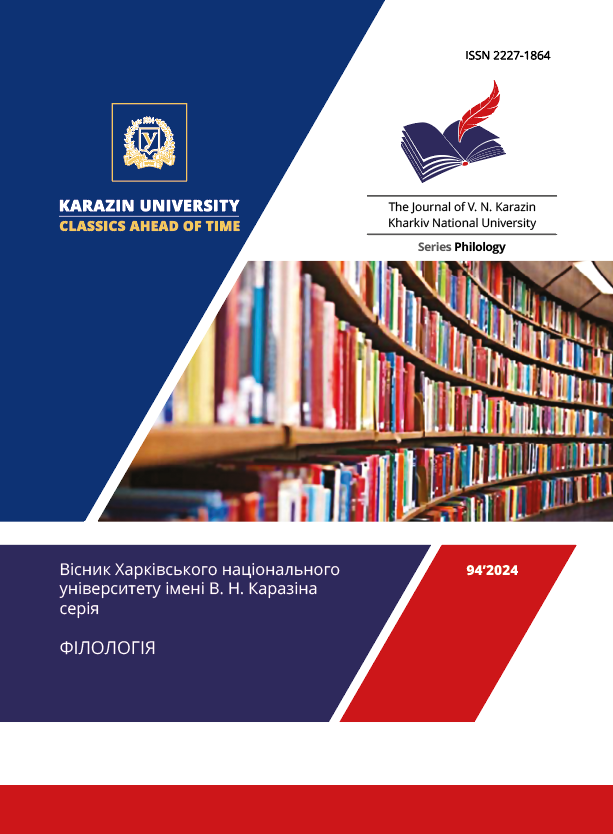The title as a constituent and structural component of T. G. Shevchenko's poetic works: general characteristics, specifics
Abstract
The author of the article focuses on the paratextuality of "Kobzar" by T G. Shevchenko, particularly, on the relationship between the poetic texts of the collection and the titles. There made an attempt to classify the titles of the works from different positions.
The poetic book of the well-known Ukrainian author includes 237 works, only 80 of them have material names. Materially expressed titles of poems, ballads and poems are in the researcher’s special consideration.
The titles of T G. Shevchenko's poetic works are diverse in terms of substantive and factual information: they indicate the characters of the work, the place of "action", determine the main image-symbol or artistic detail, indicate information about the time. Also, T. G. Shevchenko's "Kobzar" presents trait names, symbolic names, attribute names, generalizations based on social phenomena, etc.
Special attention is focused on the extratextual information of the titles, when their basis is not only the content of the work, but its associative connection with other aesthetic objects: allusions that testify to the connection with the folklore national-cultural context; allusions to the biblical text; allusions based on a connection with a specific person; borrowing titles; genre headings; names based on persistent phrases or aphorisms.
In general terms, the author of the article analyzes zero titles. The characteristics of "technical" names by "theme" is presented (the lexical and syntactic features of the first phrase are used): name-phrases in which there is the author's assessment and the assessment of the characters, there is a hint of philosophical reflections, landscape description, dreams, warnings, memories, etc. It is noted that this classification of zero titles is conditional and does not fully convey the philosophical content of the works, somewhat impoverishes their poetic symbolism and only to some extent adjusts to the previous perception of the text.
Downloads
References
Boeva, E. V. Titles in the creative heritage of Hryhoriy Skovoroda (structural-semantic aspect). URL: http://surl.li/rajcu
Buchko, D. (2004). Toponymy in the poetic works of Taras Shevchenko. Collection of works of the Ternopil city branch of the Scientific Society named after T. G. Shevchenko. Vol. 1. P. 51–59.
Vegesh, A. (2021). The title in the novels of Volodymyr Lys is the core of the artistic canvas. Scientific Bulletin of Uzhhorod University. Philology series. Issue 1 (45). In honor of Kyril Yosypovych Galas (to the 100th anniversary of his birth). Uzhgorod: Publishing House PP Danylo S. I. P. 110–117.
Gladina, H. & Senina, V. (2003). Anthroponyms and their varieties in the work of Taras Shevchenko as a means of artistic expressiveness and imagery. Scientific notes of TDPU named after V. Hnatyuk. Ser. Linguistics. Vol. 1 (9). Part 2. P. 119–124.
Hrytsyuk, L. F. (1992). Image-semantic approach to the classification of headings. Linguistics. № 2. P. 51–56.
Danylenko, I. (2006). Prayer in the poetic discourse of Taras Shevchenko. Word and time. 2006. № 6. P. 15–20.
The genre of the message in the work of Taras Shevchenko ("And the dead and the living..."). URL: http://surl.li/rajrr
Zagnitko, A. P. & Domracheva, I. M. (2001). Fundamentals of speech activity: teaching. manual. Donetsk: Ukrainian Cultural Center. 56 p.
Karpenko, Y. O. (2008). The title of the work as an object of onomastics (Mainly based on the material of Mykola Bazhan's work). Literary onomastics: coll. аrticles. Odesa: Astroprint, 2008. P. 29–37.
Merzhvinskyi, V. (2007). The poetics of the titles of Lesya Ukrainka's dramatic works. Word and Time. 2007. № 2. P. 32–40.
Onyshchenko, O. (2017). Paratextuality – a means of the author's interpretation of society. Journal of Philology, History, Social and Media Communication, Political Science, and Cultural Studies. SPHERES OF CULTURE. Volume XVІ. Lublin. Р. 35–42. URL: http://surl.li/rajaa
Pyskach, O. (2014). Ritual names in the works of Taras Shevchenko. Scientific Bulletin of Uzhhorod University. Series: Philology. Social communications. Issue 1 (31). P. 355–360. URL: http://surl.li/rajhc
Rarytsky, O. A. (2018). Рoetics of the title in the artistic and documentary text of the sixties. Scientific works of Kamianets-Podilskyi National University named after Ivan Ohienko. Philological sciences. 2018. Issue 46. P. 48–54.
Samoilenko, V. V. (2020). Functions and structure of titles in modern works for children. Scientific Bulletin of KhSU. German studies and intercultural communication series. № 1. P. 245–249.
Skoryna, L. (2017). Mykola Zerov's poetry: artistic dimensions of paratext. Journal of Philology, History, Social and Media Communication, Political Science, and Cultural Studies. SPHERES OF CULTURE. Volume XVІ. Lublin. Р. 239–246. URL: http://surl.li/rajaa
Skoryna, L. (2009). Poetics of the title of Mykhailo Dry-Khmara's poems. Herald of Cherkasy University. Series "Philological sciences". Vol. 167. P. 27–33. URL: https://eprints.cdu.edu.ua/1795/1/167-27-33.pdf
Cheletska, M. (2007). Nomenosphere of Ivan Franko's poetry (poetics of titles, dedications, epigraphs). NAS of Ukraine. Lviv branch of the Institute of Literature named after T. G. Shevchenko / resp. ed. M. Z. Legky. Lviv. 304 p. (French studies series. Issue 9). URL: http://surl.li/rajdm
Cheletska, M. M. (2005). The principles of formation of the title terminological paradigm in modern literary studies. Visn. Zhytomyr. state University named after I. Franko. № 22. P. 200–203.
Chmyr, A. V. (2022). Paratextual elements in the novel "Danilo Ostrozky: an image embroidered with beads" by Peter Kraljuk. Scientific notes of TNU named after V. I. Vernadskyi. Series: Philology. Journalism. Volume 33 (72). № 1. Part 2. P. 188–194. URL: http://surl.li/rajed
Shevchenko, T. G. (2023). Kobzar. Kyiv: KSD. 672 p.
Yuldasheva, L. P. (2016). The title as a textual and metatextual component. Science and Education a New Dimension. Philology, IV(21), Issue: 98. URL: http://surl.li/rajgl
Yuldasheva, L. P. (2019). Titles of modern works of art: structure, semantics, pragmatics. Kyiv: Kyiv International University Publishing House. 225 p.
Yuldasheva, L. P. & Kobylina, Yu. M. & Kolomynska, T. B. (2022). Pragmatic peculiarities of titles of modern Ukrainian literature. Scientific notes of TNU named after V. I. Vernadskyi. Series: Philology. Journalism. Volume 33 (72). № 1. Part 1. P. 83–90.




